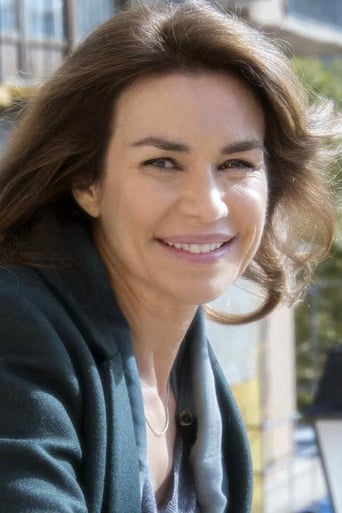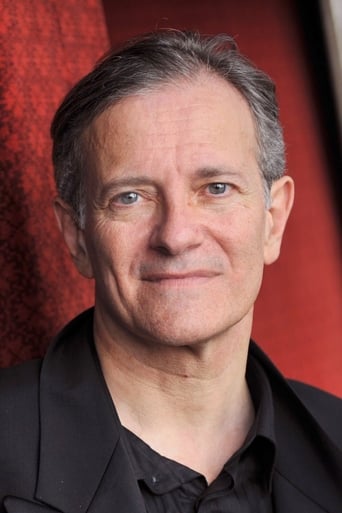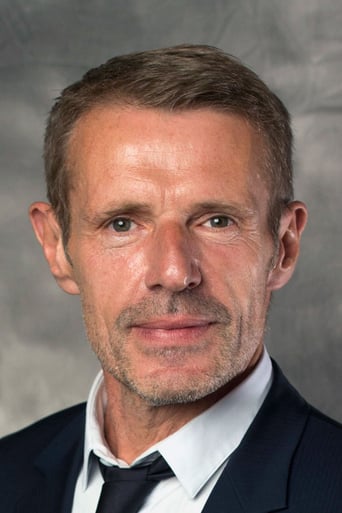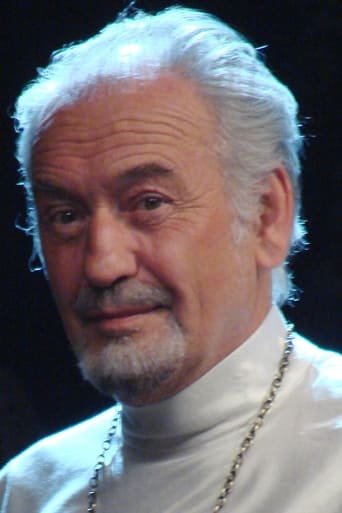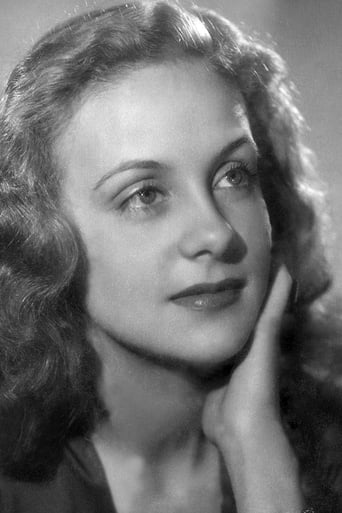Jeanskynebu
the audience applauded
Cleveronix
A different way of telling a story
Plustown
A lot of perfectly good film show their cards early, establish a unique premise and let the audience explore a topic at a leisurely pace, without much in terms of surprise. this film is not one of those films.
Humaira Grant
It’s not bad or unwatchable but despite the amplitude of the spectacle, the end result is underwhelming.
guedesnino
"La femme publique" does not allow traces of subtlety. In fact, in fantasy or in the mixture between these two poles, everything is said or shown in excesses.To the unsuspecting, it is the warning: the work of the Polish director Andrzej Żuławski is neither rest nor invitation to the contemplative gaze, nor does it want to be analytical. It allows, however, many reflections and moments of pure poetry, but its main characteristic is the disturbing, provocative, rebellious and critical figure about life and consequently about man."La femme publique" was made in 1984 with inspiration from the novel "Demons" by Dostoevsky. Scenes of this same healthy play used in a film that is being made within the film itself or what would be the main story "La femme ..." this use of metalanguage, which often complicates the understanding of the work, yields, in Counterpart, a valuable game that even equates the audience with the protagonist of the story, the dizzying Ethel (Valérie Kaprisky).She equates in the sense that Ethel is a young aspiring actress who can not differentiate acting and reality, to the point of assuming the figure of a dead woman whose murderer is the abusive and displaced director Lucas Kesling (Francis Huster), add to this plot the A figure of Milan (Lambert Wilson), a Czech immigrant who is manipulated by the filmmaker (Lucas) to commit a political assassination. Among these three characters that form a love triangle that is never realized or wanted to be performed, we accompany the fears, insanities, challenges and impulses as archetypes of a fictional world mirrored to the real.At various moments in the film, we feel as if we are as lost as Ethel, and as his character, there is no one who can give us hands, on the contrary, whenever someone arises we are attacked either verbally or physically, which establishes A very crazy game that makes us embarrassed, because when this game is fictional (that is being shot during the main movie) such aggressions are even well received, but when they reveal themselves in the reality of the lives of those actors, human beings, it is an aggression Even though there is a strong backing that we are watching a performance within the other, but again, as it is mirrored in real life, it is a madness and aggression common to human life.Whether it's a recording set, a movie day, or the end of the movie, where actors like a theater revere the public's applause. In all these moments that mix reality and fiction, the palette of tones used in "La femme publique" does not allow traces of subtlety. In fact, in fantasy or in the mixture between these two poles, everything is said or shown in excesses. Because the traits are so gross, the moments of failure and the uncertainty of which world we are, soften this drama. It is interesting to note the theatrical references that accompany the director Andrzej Żuławsk, not only of theatrical authors, but in reference to theatricals like Brecht, with his political theater with ruptures and fragmentation of the scenes, besides the "I" narrator where the figure of the actor is Sometimes the intermediary of the author's ideas. Another theatrical reference is by Antonin Artaud is his theater of cruelty, where the actors look for in real situations and emotions to bring them and to revive them in the stage, like the young actress Ethel of the film, however, that is lost when mixing Reality and fiction.Although relatively narrow, Zuławski weaves his own tale of political violence with Dostoyevsky. Kesling explains that he wants to adapt the novel because it is "a prophetic tale about those who try to change the world through violence," and strangely it becomes the incarnation of Stavrogin and Verkhovensky. Zuławski selects key scenes from "Demons" to include as the film within a movie and most of them have to do with political content. The scene at one of Verkhovensky's meetings is brilliantly filmed as a sweaty game on an indoor tennis court, where it is stated that "murder, blackmail, extortion, bombs" will be added to his agenda, and a list of people to be killed must Be drafted immediately.The camera in the films of Żuławski is chained in scenes, advancing in the arrows and actively seeking the actors, most scenes of "Femme Publique" is struck by low and daring angles that make Kaprisky a species of totemic goddess or a lost soul in means To vertiginous and cavernous European buildings, spiral staircases and dilapidated columns. But this is also his most sumptuous film in terms of lighting, courtesy of the celebrated director of photography Sacha Vierny.No longer the acting of the actors is the height of the film, but Valérie Kaprisky with its Ethel dominate the scene. If at the beginning of the film we have the young actress with lots of magazines of famous actors, the same happens with the consecration, even if fantastical of Ethel, stamping another pile of magazines, becoming the actress and woman publishes. Ethel's eroticism, through her body, her dance and her beauty, which is eternalized in this film and will surely be in the public's memory for a long time.
SnoopyStyle
Struggling actress Ethel (Valérie Kaprisky) does private nude modeling sessions for photographer André. Famed director Lucas Kessling wants her as lead in his adaptation of Dostoyevsky's "The Possessed". They get into a relationship and a surreal film production. He recruits dishwasher Milan Mliska (Lambert Wilson) to be her possessive disturbed husband as reality and fiction blend into this unreal journey.This is an unreal film. Kaprisky is sexually unencumbered and magnetically charismatic. She does plenty of strut-walking. She powerfully fills the screen. Lucas Kessling is an intriguing mercurial character. The surrealism is interesting at first but it gets maddeningly unreal. The wild swings and crazy 180 turns frustrated me. There is one scene in particular where Ethel faints and completely recover immediately with everybody ignoring what happened. It's a cheap kind of surrealism. It's almost student film level. Other parts like her nude photography is unforgettable. At some point, the weird surreal twists and turns bored me by their unhinged-nature.
chaos-rampant
I love this guy, this madman and anarchist of cinema. I love him for the reasons he seems to vex a lot of people; muddled screenplays is the frequent complaint, hard to understand, extreme in everything he does. It is simply a matter of approach. In ordinary films, the filmmaker presents a more or less conventionally understood reality, and asks of us to penetrate behind the words and masks of people hiding their true selves, to get to something essential of emotions and dynamics. We infer from a subtle gesture, from a meaningful look.Zulawski's method is one of shattering the clean boundaries of roles and framed narrative, all the things that keep us at arm's length from ever really feeling the soul of a character in our skin, doing so with impunity, so that we are free to swim and see into the inner world of urges and emotional thought, pure mindstream. What you would normally have to infer is up there on the screen. The skin of consciousness has been turned inside out, reversed: the pedantic details of all this having linear sense and plot are now beyond our reach, the actual battered soul is visible.This is nothing to scoff at, in fact it is the most advanced dimension in film. Reversed innerseeing. Ecstatically hovering out of self and story. It is what Lynch only accomplished with Inland Empire, acknowledging the Polish influence.Possession is sublime, the pure convulsing horror of a soul being torn apart. It was out of this world, everyone from Cronenberg to Lynch sat down and took notice. The story goes that he was so hellbent on that film to coax the raw emotion he wanted out of Isabelle Adjani, he did some pretty horrible things to her. Here is the followup to that: an obsessive, half-mad filmmaker (ex-pat working in France) torments his young starlet on the artistic journey to perfection. Their film is an adaptation of Dostoyevski's The Possessed (wink). She is eager, talented, but the murky depths of his vision escape her.Everything else is madness, flailing, fluid self, the exposing of raw nerves in the frantic experience of the mindstream.This seems murkier than Possession, because it lacks the actual monster and clean symmetry of doubles. It's in the same vein. Forces in these people are so painful and overwhelming, the characters have splintered into several more selves, and each splintered self is maniacally pushing against the limits of his narrative - some of them inside the play, others in separate subplots. Two ex-pats, frustrated in Paris with the hypocrisy of art and religion - one of the murders a cardinal, both are present in the scene, both photographed in a film-within. Two actresses, both mistresses of the same two guys.So he is angrier than Tarkovsky. Has none of Malick's piousness. Ruiz and Wojciech Has are playful, he is bitter and mad. He sees ugliness, sin, impurity. And he has several rough spots, of symmetry and politicking, both shouted.But he worships the same awesome god: not the cardinals' god, but the recognition of something that goes beyond the small limits of reason and self, and tries to awaken the vastness of that in his own narratives of fluid and battered egos.And he has trusted collaborators on the journey. Valerie Kaprisky is divine, ecstatic dancer to the mystery of shedding skin.Sacha Vierny, that mage of cinematic light; Resnais, Greenaway, Ruiz, Zulawski, he has enriched all four with his eye.And if all of that seems gibberish to you, you should know of the rich tradition of Buddhist gurus called mahasiddhas, who used madness and gibberish as a tool for wisdom. A similar notion of desired irrationality is encountered from Zen to Dada.The thinking mind is a meddlesome monkey. Confound, confound, confound. Something to meditate upon.
sarastro7
I am prompted to write this user review by the ghastly unhelpful two previous reviews here, which do not do the movie a single jot of justice. One wonders why they have bothered to comment, when it seems they have not even seen the movie in a language they can understand.Naked dancing will of course attract some (in this case, well-deserved) attention, but my impression of the movie was that the whole "public woman" theme is actually the least explored of multiple other themes in the movie. The movie is about movie-making, and in turn about the difference between cinema and reality, meaningfully underscoring its point by being excessively melodramatic in its movie-within-the-movie bits (incl. the opening sequence). It is not a movie for obtuse audiences. The movie being made inside the movie is an adaptation of Dostoyevski's "The Possessed", which I am certain it will help to have read, although it is really being chewed up to an over-the-top degree here.The Czech guy (played by Lambert Wilson of Matrix fame) is a snitch who has reported his dissident friends to the communist authorities, and subsequently become an assassin for them - one they intend to use as a "lone nut" scapegoat in getting rid of a Lithuanian cardinal who's getting too popular. This being Zulawski's account of his own role as a rising star in communist Poland, and what he imagines the authorities want to do to him (which is why he transferred his career to France).This is a complex and unique movie which will stimulate and challenge intelligent viewers. The rest will simply be confused.9 out of 10.

